The Alliance maintains a growing library of resources on climate finance and sustainability risk management. Our publication library provides cross-cutting knowledge, tools, and business information to empower financial institutions to develop green finance roadmaps.
FEATURED PUBLICATION
-
Defining an Ambitious Climate Strategy of Green Banking: A Case Study
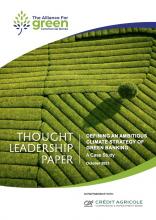
The sustainable finance market has seen a steady development in the last decade, experiencing a phase of exponential growth. The increasing severity, frequency, and impacts of climate change have put more pressure on financial institutions to recognize their role in catalyzing a more sustainable and low-carbon future. Issued by Crédit Agricole CIB and the Alliance, the paper expounds a “Five-Step-Approach” to guide the process of transformation towards green banking, inspired by Crédit Agricole CIB's own experience in setting up the strategy and governance in its transition towards green banking, as well as supporting clients in their transition journey. The paper also reveals the core elements of green banking practices and the relevant key practices of Crédit Agricole CIB, drawing references from international advocacy groups, regulatory guidelines, and the experiences of market leaders. The paper is also the first-of-its kind in the whitepaper series led by the Alliance.
Learn More
-
Repurposing Power Markets: The Path to Sustainable and Affordable Energy for All
November 29, 2024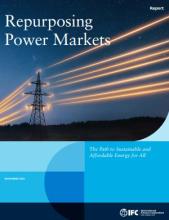
How can emerging markets extend access to electricity while maximizing use of sustainable power sources? A new IFC report suggests that bringing more competition into power markets can result in better outcomes, both in terms of widening access and boosting sustainability.
Learn More -
IFC’s Sustainable Rice Market Insights
November 21, 2024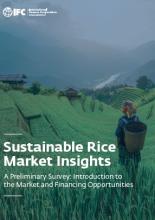
IFC’s Sustainable Rice Market Insights report explores the current state of global rice markets as well as the origin and evolution of the SRP to support the transformation of the rice sector towards sustainability. The report reviews the range of IFC's experience in the rice sector to date and explores financing opportunities in sustainable rice supply chains, including sustainability-linked loans.
Learn More -
How Climate Risks Are Shaping the Landscape for Asia-Pacific Financial Institutions
October 30, 2024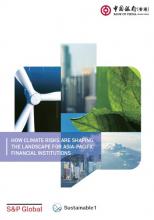
As the damage from extreme weather events becomes more apparent, the urgency increases for companies to understand, measure and manage the risks they face from climate change and the interlinked crisis of biodiversity loss. Data can help financial institutions make informed decisions about how to develop effective sustainability strategies to reduce their climate and environmental risks. This report provides a detailed analysis of how financial institutions can enhance their resilience to climate risks and support the transition to a low-carbon economy.
Learn More -
Rising to the Challenge: Success Stories and Strategies for Achieving Climate Adaptation and Resilience
October 30, 2024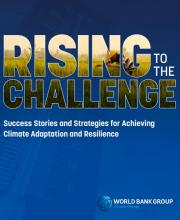
About 1.2 billion people are at high risk from climate-related hazards, but much can be done to make people, business, communities, and countries more resilient. With a collection of 30 examples from the private sector and 9 public-sector reforms or interventions, including public-private partnerships, the report shows that promising adaptation and resilience efforts are undertaken globally and have measurable results. These initiatives and good practices can be replicated to scale up action and to build resilience for all.
Learn More -
Biodiversity Finance Metrics for Impact Reporting
October 08, 2024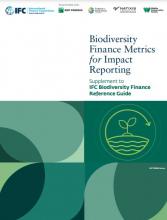
As a supplement to IFC’s Biodiversity Finance Reference Guide, this document is designed to provide expanded guidance on impact reporting for eligible biodiversity finance activities. Impact reporting is one of the four core components required for alignment with the Green Bond and Loan Principles and seeks to ensure transparency and accountability. This supplement aims to facilitate effective impact reporting by offering indicative metrics for each eligible biodiversity finance activity identified in the guide.
Learn More -
Cooler Finance
September 25, 2024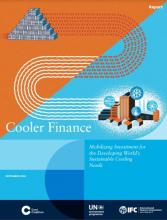
The report quantifies sustainable cooling investment needs and financing gaps, highlighting many opportunities for private investors in a market that could grow to more than half a trillion dollars per year by 2050. Accelerating the adoption of passive cooling, energy efficiency and refrigerant phase down, would reduce electricity consumption, spending on equipment, and future power sector investments by more than $8 trillion in developing countries over the next 25 years.
Learn More -
The State of Play: 2023 Climate Transition Plan Disclosure
June 27, 2024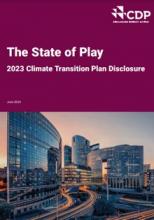
Climate transition plans are a vital tool to demonstrate to investors, suppliers, customers and other key stakeholders that an organization is committed to achieving a 1.5-degree pathway transition, and that its business model will remain relevant (ie profitable) in a net-zero carbon economy. CDP's latest report, The State of Play: 2023 Climate Transition Plan Disclosure, shines a spotlight on how far along organizations are on their journey to developing credible climate transition plans.
Learn More -
Accelerating Industrial Decarbonization in China: Key Climate Actions for Iron and Steel Companies
June 27, 2024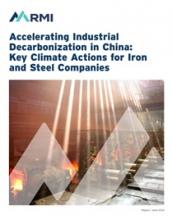
This report provides a comprehensive summary of international target-setting practices, examining their boundaries and pathways under the 1.5°C climate goal by 2050. While global practices serve to guide Chinese iron and steel companies to set climate-aligned targets, an industry-level target broken down from China’s national goals of carbon peaking by 2030 and carbon neutrality by 2060 will help direct companies’ level of ambition and pace of transition.
Learn More -
Climate Adaptation Costing in a Changing World - Valuing Climate Adaptation Helps us Orient our Compass Toward Effective and Resilient Pathways
June 26, 2024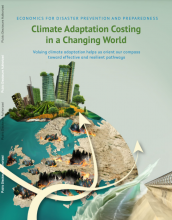
This report reviews evidence-based prioritization and costing approaches and illustrates their application in a series of case studies. These approaches can support policy makers in identifying bankable and effective adaptation investments, raising and allocating adequate financing, and thus ultimately facilitating more effective climate change adaptation across Europe.
Learn More -
State and Trends of Carbon Pricing 2024
May 21, 2024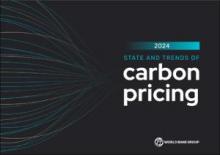
This report provides an up-to-date overview of existing and emerging carbon pricing instruments around the world, including international, national, and subnational initiatives. It also investigates trends surrounding the development and implementation of carbon pricing instruments and some of the drivers seen over the past year. Specifically, this report covers carbon taxes, emissions trading systems (ETSs), and crediting mechanisms. Key topics covered in the 2024 report include uptake of ETSs and carbon taxes in low- and middle- income economies, sectoral coverage of ETSs and carbon taxes, and the use of crediting mechanisms as part of the policy mix.
Learn More

